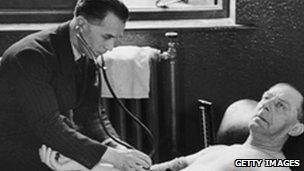Blue Labour: Party's radical answer to the Big Society?
- Published

Are Blue Labour's welfare plans the party's answer to David Cameron's Big Society?
There is a new force in the Labour Party with a radical plan to win back working-class voters and provide the left's response to David Cameron's Big Society.
It is called Blue Labour and it wants a rethink of what, for many, was the party's greatest achievement - the creation of the welfare state in 1945.
Blue Labour's intellectual godfather is the academic and community organiser Maurice Glasman - this month elevated to the House of Lords by Labour leader Ed Miliband.
Lord Glasman believes that, in the post-war period following the creation of the National Health Service, Labour developed a top-down model of government that became "remote, bossy and managerial".
"1945 was a wonderful achievement of solidarity," he told Radio 4's Analysis programme. "But the sting in the tail of 1945 was that it broke all the mutual solidarity - the ways we took care of each other - and handed them over to the state."
According to another Blue Labour thinker, the Oxford University political historian Marc Stears, Gordon Brown's defeat in the last election was "a moment of reckoning" for the party.
Quality of relationships
"We've gone for many years now in a state-driven, redistribution-driven, equality-driven Labour tradition that comes straight out of 1945," said Dr Stears.

Lord Glasman says Labour should return to the party's pre-war roots
"There are many good things about that: it cares about fairness and equality.
"But what it doesn't do is acknowledge that what matters in everyday life is the quality of our relationships - our family life, our ability to go to church or to mosque or to synagogue, to have relationships there with other people, to care for our elderly.
"All of those elements got forgotten and it's those elements we now need to regain."
Blue Labour wants what it calls a more "relational" style of politics, which redistributes not just wealth but also power back to local communities. And it wants to see those communities taking more responsibility for their own lives.
"The idea that you could have three generations of one family on welfare in the same house and that's seen as a good society is anathema to me," said Lord Glasman, who has written speeches for both the Miliband brothers.
"Work and responsibility are core Labour values. I want to see a more relational state that doesn't just provide personal care packages, but calls on people to meet each other, talk together and work together for the common good."
Blue Labour's plan for delivering the common good involves a revival of the Labour tradition of mutuals, co-operatives and friendly societies, the creation of local banks and a new system of worker representation on company boards.
And when it comes to the delivery of public services, it wants more localised provision and an end to what it sees as "Labour's obsession with postcode lotteries".
Dr Stears, an old college friend of Ed Miliband, is about to lead a major research project for the Institute of Public Policy Research, external on Labour's response to the Big Society, external.
Influential supporters
He said: "There's a kind of aspiration - you might call it a myth within the Labour party - that it can eradicate the postcode lottery. That aspiration can't be realised.
"That's why we need to get away from this obsession with absolute fairness, with material equality," he adds. "At the risk of sounding like Tony Blair, I think we need to be experimental. It's crucial that we're not dogmatic.
"If that means private sector operators working in collaboration with the providers and the recipients of services in a more relational, more democratic way, then we have to be prepared to say that that's the right move forwards."
Blue Labour is gaining some influential supporters, including the Blairite former Labour minister, James Purnell.
"I think the renewal of the Labour Party will come out of a synthesis of Blue Labour and New Labour," he said. "There was something change-manic about New Labour. I think what Blue Labour does is remind the Labour movement of what its original values were."
Non-negotiable
But for Labour veteran Roy Hattersley, a commitment to fairness and equal public services is a non-negotiable part of being a socialist.
Lord Hattersley said: "The postcode lottery programme was about trying to provide equal levels of high services throughout the country.
"It seems self-evident to me that a social democratic government should want to have an equal level of high-quality services throughout the country rather than if you live in a city, you're likely to have a shorter life expectancy than if you live in the country.
"Blue Labour seems very nostalgic to me. This is the idea of Arcadian England, the idea that there was some mythical time when we all loved each other," he added.
"Well, before the creation of the welfare state, we all died of illnesses early on because all the things that the state provided were not available in those days."
Ed Miliband has launched a major review of Labour Party policy and it remains to be seen how much Blue Labour thinking will be adopted by the party.
However, if recent speeches and media interviews are anything to go by, we can expect to hear more of Blue Labour's themes and language from senior figures in the party as Labour tries to rebuild bridges with its lost working-class voters.
Analysis is on BBC Radio 4 on Monday, 21 March 2011 at 2030 GMT. Listen via the BBC iPlayer download the podcast or join Analysis on Facebook, external.
- Published14 February 2011
- Published9 February 2011